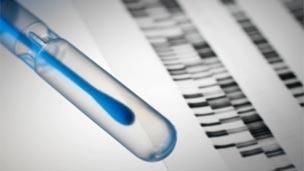Four hours for forensic DNA test
- Published

A cheek swab provides the DNA needed for the test
Forensic scientists have developed a test that can match a suspect's DNA to crime scene samples in just four hours.
The new technique could greatly speed up forensic DNA testing, making the process almost as easy as matching fingerprints.
Police could check whether a suspect's DNA matches profiles in a database before a decision is taken on whether to release them from custody.
Researchers describe their approach in the journal Analytical Chemistry.
Their report points out that a large number of individuals re-offend while on police bail.
In the UK, 75% of people arrested are released from police custody within six hours and 95% are released within 24 hours.
At the UK's Forensic Science Service (FSS), urgent samples can be prioritised on request and, once delivered to a lab, can be processed in about eight hours.
But even this is labour intensive and relatively expensive, say the researchers.
A team led by Andrew Hopwood from the FSS and Frederic Zenhausern from the Center for Applied NanoBioscience and Medicine in Arizona, US, set out to develop a system capable of processing a sample and generating a DNA profile within a six-hour window.
The researchers built an instrument with a DNA processing cartridge and a special chip to analyse DNA samples from a cotton swab.
Forensic technicians can collect DNA from suspects by swabbing the insides of their mouths, mixing the sample with a few chemicals, and warming it up.
The device does the rest, producing a genetic profile that can be compared against crime samples in a database.
The process, from taking a cheek sample, to the production of a DNA profile, takes about four hours.
The researchers believe that by optimising the process, they should be able to cut this to three hours in the near future.
But in order to get the most out of the technology, they argue, it must be supported by a capability that allows law enforcement officers to search for matches in real time.
Neither the Federal Bureau of Investigation's (FBI) CoDIS DNA database, nor the UK National DNA database can currently support rapid DNA testing technology.
Writing in Analytical Chemistry, the researchers add: "While the operation of the instrument is straightforward, a good level of training is required before the instrument can be operated.
"But we believe that any individual with a basic scientific education could become competent."